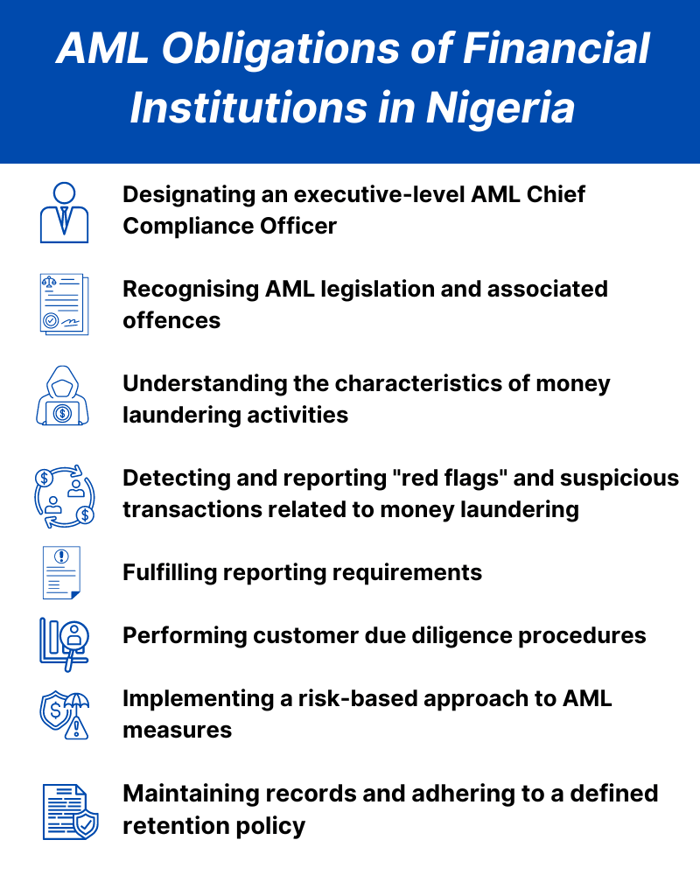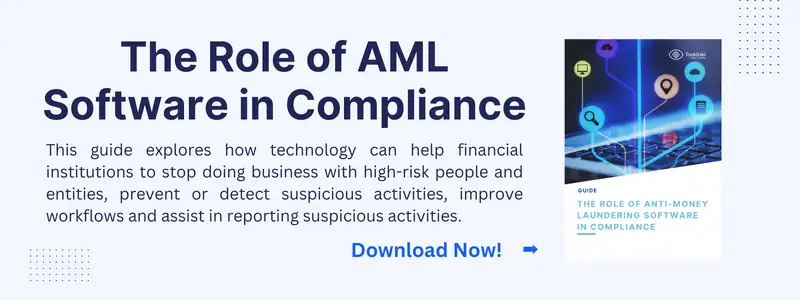Nigeria, as Africa's largest economy and one of the most populous countries in the world, faces significant challenges in combating money laundering and financial crimes. Given its strategic position in West Africa and the growing fintech sector, the country has become an attractive target for money launderers and criminal organizations. As a result, AML compliance has become a top priority for regulators, financial institutions, and businesses operating in Nigeria.
Implementing robust AML controls is crucial for financial institutions and businesses in Nigeria to protect their reputation, maintain customer trust, and avoid hefty penalties from regulators. Strong AML systems not only help detect and prevent money laundering activities but also contribute to the financial sector's stability, improve investor confidence, and promote economic growth in the country. Moreover, adherence to international AML standards is vital for Nigerian businesses to participate in global financial markets and attract foreign investments.
Tookitaki, a leading global provider of AML compliance solutions, offers a comprehensive suite of cutting-edge tools designed to help financial institutions in Nigeria effectively combat money laundering and financial crimes. With Tookitaki's innovative solutions, organisations can efficiently navigate the complex regulatory landscape, streamline compliance processes, and stay ahead of emerging threats. In this blog, we will explore the AML regulatory landscape in Nigeria, discuss the challenges faced by financial institutions, and showcase how Tookitaki's solutions can help businesses achieve robust AML compliance.
AML Regulatory Landscape in Nigeria
Overview of AML regulations
Nigeria has implemented a comprehensive legal framework to combat money laundering and terrorist financing. The primary legislation governing AML compliance is the Money Laundering (Prohibition) Act (MLPA), which criminalizes money laundering activities, establishes reporting and record-keeping requirements, and sets forth penalties for non-compliance. The MLPA has been amended several times in 2004, 2011, and most recently, in 2022, to strengthen its provisions and align them with international standards, such as the Financial Action Task Force (FATF) recommendations.
Another critical piece of legislation is the Terrorism (Prevention) Act, which focuses on countering terrorist financing and includes provisions for freezing and seizing assets of designated terrorist organizations. In addition to these laws, financial institutions must also comply with guidelines and directives issued by their respective regulators. Other relevant laws include the Central Bank of Nigeria (CBN) Regulations on Anti-Money Laundering, which was passed in 2022 to align with the provisions of the Money Laundering (Prohibition) Act 2022.

Key regulatory bodies
Several regulatory bodies oversee AML compliance in Nigeria, each focusing on different sectors of the financial industry:
- Central Bank of Nigeria (CBN): The CBN is the primary regulator for banks and non-bank financial institutions. It is responsible for issuing guidelines and directives on AML compliance, conducting examinations, and taking enforcement actions against non-compliant entities.
- Nigerian Financial Intelligence Unit (NFIU): The NFIU is the country's financial intelligence agency, responsible for receiving, analyzing, and disseminating financial intelligence reports to law enforcement agencies and regulators.
- Securities and Exchange Commission (SEC): The SEC oversees the capital market and securities sector and enforces AML compliance among capital market operators, including broker-dealers and investment advisers.
- National Insurance Commission (NAICOM): NAICOM regulates the insurance industry and enforces AML compliance among insurance companies, brokers, and agents.
Recent developments and enforcement actions
In recent years, Nigeria has made significant progress in strengthening its AML regulatory framework and increasing enforcement actions against non-compliant entities. The country has taken steps to address the FATF's concerns and to be removed from the FATF's list of countries with strategic AML/CFT deficiencies.
Enforcement actions by regulators have also increased, with financial institutions facing penalties and sanctions for non-compliance with AML regulations. In recent years, several banks have been fined for failing to adhere to customer due diligence requirements, reporting obligations, and other AML compliance measures.
This heightened regulatory scrutiny highlights the need for financial institutions and businesses in Nigeria to implement robust AML compliance programs and stay up-to-date with evolving regulations and enforcement trends.
Challenges Faced by Financial Institutions in Nigeria
High volume of transactions
Financial institutions in Nigeria face the challenge of handling a high volume of transactions daily. As the largest economy in Africa, Nigeria witnesses significant financial activity, making it difficult for banks and other institutions to monitor and identify suspicious transactions. This increases the risk of money laundering and other financial crimes, placing pressure on compliance teams to detect and prevent illegal activities.
Evolving money laundering techniques
Criminals are constantly developing new money laundering techniques to evade detection, making it challenging for financial institutions to stay ahead. These methods include trade-based money laundering, virtual currencies, and the use of shell companies, among others. As technology advances, so do the ways criminals exploit it, requiring financial institutions to continuously update their knowledge, tools, and systems for achieving holistic risk coverage.
Limited resources and expertise
Financial institutions in Nigeria often have limited resources and expertise in AML compliance. Adequate training and the development of skilled compliance teams are essential in identifying and preventing financial crimes. However, due to financial constraints and the shortage of qualified professionals, many institutions struggle to maintain robust AML controls. This challenge is further compounded by the need to invest in advanced technology and systems to keep pace with the evolving financial landscape.
Complex regulatory environment
The complex regulatory environment in Nigeria presents another challenge for financial institutions. Banks and other financial institutions must navigate a demanding compliance landscape with numerous laws, regulations, and guidelines, as well as multiple regulatory bodies. Ensuring adherence to all relevant regulations and staying up-to-date with the latest changes can be daunting, making it difficult for institutions to maintain full compliance and avoid penalties and sanctions.
Tookitaki's Innovative Solutions for AML Compliance
Tookitaki is a pioneer in the fight against financial crime, leveraging a unique and innovative approach that transcends traditional solutions. The company offers two distinct platforms -- the Anti-Money Laundering Suite (AMLS) and Anti-Financial Crime (AFC) Ecosystem -- that work in tandem to address the limitations of siloed systems in combating money laundering.
The AFC Ecosystem is a community-based platform that facilitates sharing of information and best practices in the battle against financial crime. Powering this ecosystem is a Typology Repository, a living database of money laundering techniques and schemes. This repository is enriched by the collective experiences and knowledge of financial institutions, regulatory bodies, and risk consultants worldwide, encompassing a broad range of typologies from traditional methods to emerging trends.
The AMLS is a software solution deployed at financial institutions. It is an end-to-end operating system that modernises compliance processes for banks and fintechs. The AMLS collaborates with the AFC Ecosystem through federated machine learning. This integration allows the AMLS to extract new typologies from the AFC Ecosystem, executing them at the clients' end to ensure that their AML programs remain cutting-edge.
The AMLS includes Transaction Monitoring, Smart Screening, Dynamic Risk Scoring, and Case Manager modules. These modules work together to provide a comprehensive compliance solution that covers all aspects of AML, including detection, investigation, and reporting.
Benefits of Adopting Tookitaki's AML Solutions
- Improved efficiency and reduced false positives: Tookitaki's innovative AML solutions use advanced machine learning algorithms to significantly improve the accuracy of detecting suspicious activities. This leads to fewer false positives, enabling compliance teams to focus on genuine high-risk transactions and reducing the time spent on manual investigations.
- Enhanced risk management: By incorporating advanced analytics and real-time capabilities, Tookitaki's AML solutions enable financial institutions to identify and manage risks proactively. This helps institutions better understand their risk exposure and adopt more effective risk mitigation strategies.
- Streamlined regulatory compliance: Tookitaki's AML solutions are designed to meet the stringent requirements of top-tier banks and global regulators. With built-in tools for data management, reporting, and audit trails, these solutions simplify the compliance process and help institutions adhere to the ever-changing regulatory landscape.
- Scalability and adaptability to evolving threats: As money laundering techniques and regulatory requirements continue to evolve, financial institutions need flexible and scalable AML solutions. Tookitaki's AML solutions are designed to adapt to new challenges, allowing institutions to keep pace with emerging threats and maintain robust controls in a dynamic environment.
AML Compliance in Nigeria: Embracing Tookitaki's Solutions
As the AML regulatory landscape in Nigeria continues to evolve, it is crucial for financial institutions to implement robust AML controls. This ensures compliance with both local and international regulations while also protecting the institutions and their customers from financial crime. Tookitaki's cutting-edge AML solutions, powered by advanced machine learning algorithms, help financial institutions in Nigeria overcome various challenges in AML compliance. By enhancing risk management, streamlining compliance processes, and adapting to emerging threats, Tookitaki's solutions play a significant role in safeguarding Nigeria's financial industry.
To experience firsthand how Tookitaki's AML solutions can help your financial institution tackle the complexities of AML compliance in Nigeria, we encourage you to schedule a demo with our team. Discover the benefits of adopting Tookitaki's innovative AML solutions and propel your institution towards a safer and more compliant future.
Anti-Financial Crime Compliance with Tookitaki?





